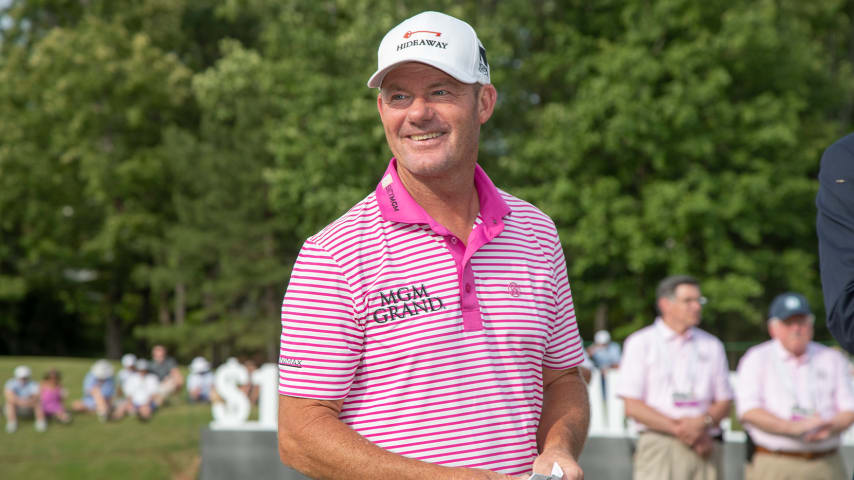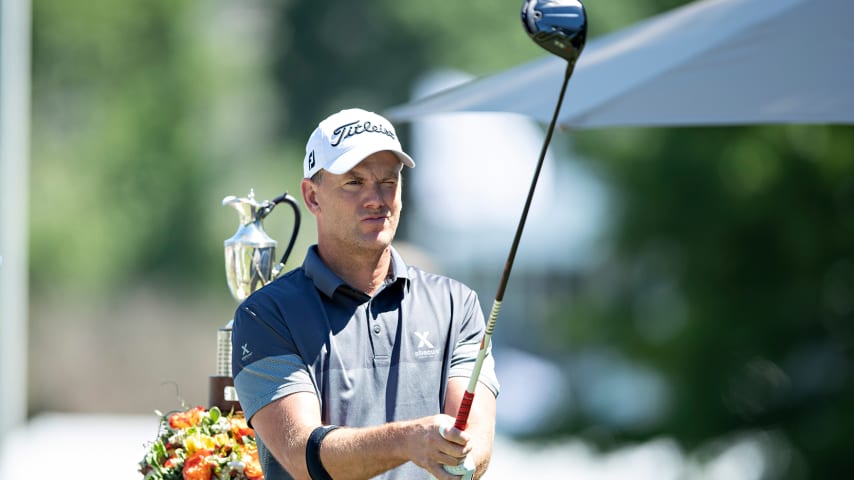Revisiting Collin Morikawa's near-win as amateur on Korn Ferry Tour
10 Min Read

As Collin Morikawa prepares for his PGA defense, a look back at when he almost won on the Korn Ferry Tour as an amateur
Written by Nick Parker
As Collin Morikawa prepares for his PGA defense, a look back at when he almost won on the Korn Ferry Tour as an amateur
Long before he became the third-youngest winner in PGA Championship history, Collin Morikawa nearly became the youngest winner on the Korn Ferry Tour.
Morikawa made just one start on that circuit, but it was a harbinger of things to come, serving as an early example of the poise and potential that Morikawa has so quickly exhibited on the PGA TOUR.
The story behind Morikawa’s lone appearance on the KFT – which he made five years ago, shortly after completing his freshman season at Cal – actually goes back another year further.
Morikawa earned his start in the 2016 Wichita Open supporting Wichita’s Youth shortly after graduating high school. The exemption came thanks to his seven-shot win in the 2015 Trans-Mississippi Amateur, a prestigious event with a long-standing history. Past winners range from legends like Jack Nicklaus and Ben Crenshaw to more contemporary names like Bryson DeChambeau, Cameron Champ and Will Zalatoris.
Morikawa added his name to the list by closing with three consecutive 64s to blow away the field at Flint Hills National in the Wichita suburb of Andover. The win earned him an exemption into the local Korn Ferry Tour event the following year.
When Morikawa returned to Kansas in 2016, he was fresh off earning Pac-12 Rookie of the Year honors. The 19-year-old had his father, Blaine, on the bag (he joked his dad was the cheapest option for a caddie). Morikawa proved he was an amateur in status only, nearly besting Jason Day’s record as the youngest winner in Korn Ferry Tour history.
As he did at the Trans-Miss, Morikawa finished with a flurry. Weekend rounds of 63-63 got him into a three-way playoff eventually won by Ollie Schniederjans. As Morikawa prepares to defend his first major title this week, it’s worth looking back at his first start in a PGA TOUR-sanctioned event and what it portended about his future.
Paired with Chris Ward and Derek Tolan in the opening two rounds at the Wichita Open supporting Wichita’s Youth, Morikawa opened with rounds of 67-70 for a 3-under 137 to make the cut on the number.
Chris Ward, former Korn Ferry Tour member: “Pretty cool to look back and think I played with him his first two pro rounds ever. I just remember he hit it very far for his size because I don’t know how tall he is, but he was pretty lean. … I remember that and his short game was very, very sharp. He was making putts from all over the place, and the short game was very good.
“He’s definitely impressive. The first two rounds I think he made the cut on the number if I remember right? He was at 3 under, and I was at even. Something must have clicked on the weekend for him to surge. I feel like there was a lot of potential there in those two rounds I played with him.”
Morikawa (at the time): “I was just trying to make the cut after the first two days, so I was sweating a bit last night. But I just wanted to enjoy it as much as I can. I stuck to my game plan today, and that’s what I’m going to do (tomorrow)."
After advancing to the weekend on the number, Morikawa shot a 63, the lowest round by an amateur in tournament history. It put him within four shots of Ollie Schniederjans’ 54-hole lead and into the top 10 entering the final round.
Roberto Diaz, a Korn Ferry Tour winner and Morikawa’s playing partner in the final round: “Of course I remember. He played with me the last round in Wichita with Ryan Brehm, and he shot 62 or 63 I remember that. (Expletive), he was really, really good. By then, he was as good as Xander (Schauffele) was when I played with Xander. That’s how I can relate it. You know you could just tell the kid was a little bit different. He was very straight, very streaky, kind of like super mature for his age, hit every shot basically and he didn’t go at every pin. He knew where he was at the time on the leaderboard, he was climbing and climbing and climbing, and he knew and the better he did the most composed he was and the more he focused. He was in the zone, and (you could tell) he knew he was going to have a great career ahead of him just by playing with him.
“I played with Xander the following year and (Schauffele and Morikawa) were both very similar in the composure they had. It’s kind of like when you play with somebody like that, they just know. They just have this aura around them like they know they’re going to be good. They’re not trying hard. They’re not going for the hero shot. They’re very patient. They just know that they have it, and they play their way around a golf course. They have five hours a day where they’re just super patient, and that’s something that you don’t see from kids when they’re that young. You can see that with guys that have been established on the PGA TOUR for a while, but these guys for being as young as they were when I played with them, they were very composed, and they just knew. If they hit a bad shot, they knew they had a couple good ones in them. It was something about it where they’re just very calm, they play very relaxed and obviously they have that fire inside them where they don’t like to lose. And the combination of being super calm and hating to lose, it’s deadly. They never think in the future, and they just want to beat you right now. They’re very Zen-like almost. They walk slow, they walk with a smile, both of them, and they enjoy the moment, and they know that sooner than later it’s going to happen. I don’t know what it is. It’s hard to explain. When they hit a bad shot, they don’t complain much, and they just hit a great shot afterwards.”
Morikawa played the final five holes of the final round in 5 under, including a long birdie at the 72nd hole, on his way to his second consecutive 7-under 63. That got him into a three-way playoff with Ollie Schniederjans, the eventual winner, and J.J. Spaun.
Morikawa: “The 27-foot birdie putt on No. 18 will be a moment I will never forget. It was center-cut the entire way. My game wasn’t as tuned as the third round, but I was able to make a lot of birdies down the stretch. With five holes to go, and being four off the lead at that point, I knew I had to do something special if I wanted any chance at winning. This week was surreal. To go from barely making the cut on the number to getting into a playoff couldn’t have capped off the week much better.”
J.J. Spaun: “Yeah, I knew (Morikawa) was an amateur so I was just stoked that if I didn’t win, I would get solo second money, which pretty much got me close to my card. I remember he was playing right in front of me, and I remember he made like a 30-footer to get into the playoff, and I was like nice, this kid is going to be in the playoff if I don’t birdie this last hole. But yeah, that’s what I vividly remember is like solo second isn’t as bad as T2 because he was an amateur.”
Schniederjans would go on to win the playoff, sending Spaun all of the second-place money and Morikawa home with a T2 in his first professional start.
Spaun: “(Morikawa and I) were hacking it around just trying to grind for pars on the first playoff hole, and I think we were both out of it on the second hole and then Ollie hit it to 20 feet and made it. But I just knew he was really good just based off getting into a playoff as an amateur. That’s super impressive and obviously he’s had a great career.”
Walter Chun, Morikawa’s coach at Cal: “Collin had to make a pretty lengthy putt on the 72nd hole to get into the playoff. So, I remember it vividly. I was with my family, and we were coming back from church and getting fast food at In N Out. Because the In N Out line is so long, I was checking my phone constantly and I just remember refreshing, refreshing, and he makes his birdie putt on the last hole, and I get a text from Sean Martin from PGATOUR.COM about this right? And I think Sean was alluding to was will this be a steppingstone to Collin turning pro early? What are your thoughts? And my thoughts were that I was super excited for Collin. That was first and foremost, but it definitely brought in this thought of he’s good enough to leave Cal early. But long story short obviously he stayed. He wanted to get into the Haas School of Business. I just remember it was a Sunday afternoon … and him shooting 63-63, and he shot like nothing at the Trans-Miss to get into that event with the rounds of 64 to blow away the field at the Trans-Miss.”
Morikawa did go on to return to Cal for his sophomore year and ended up earning first-team All-American honors in each of his last three seasons before turning pro in the summer of 2019.
Morikawa: “Who knows what could've happened if I’d won? I played well during my sophomore and junior years and all along I knew that academics was important to me. I knew what I wanted to do. I wasn't going to stay five years like a lot of guys (who attend the Haas School) do. I was going to do four and get my business degree. I learned so much just playing golf and meeting so many new people at Cal, just friends and support groups that I'll just have forever.”
Morikawa stayed, and the rest is history as he went on to win in only his sixth start as a pro – a fact that didn’t surprise Diaz or his old coach.
Diaz: “I actually called it. When they turned pro (at the 2019 Travelers Championship), that was my second year on TOUR, and everybody was giving attention to Hovland and Wolff and I told my caddie I said, ‘The best one out of the four guys turning pro – Justin Suh, Morikawa, Hovland and Wolff – is actually Morikawa.’ He was like, ‘You’re crazy dude. You’re nuts,’ and I’m like, ‘No, I’m telling you. He’s the best player out of the four. He’s going to be doing big things soon.’ He won right away. I think the kid is unbelievable. I really like his game. I think he hasn’t changed much since I played with him. He’s fitter. He was a little bit bigger when I played with him, I remember that. You could just see how good he is. He hit it very straight, very mature. He had a bright future in front of him.”
Chun: “Every time Collin’s been disappointed, whether he lost to John Augenstein at the Western Am or the U.S. Am or he didn’t win the Ben Hogan Award or things like that, when Collin doesn’t achieve what he believes he can achieve, it really pisses him off to be honest. As a good-hearted young man as he is, he’s such a fierce competitor. I just know him not winning that Korn Ferry Tour event not only probably gave him confidence that he could play at a high level but really probably upset him so that the next time he’s in that situation he wants to win.”








